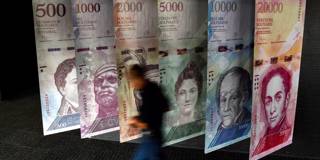Venezuela’s latest expected debt default raises the question of whether creditors should bear the risk that unauthorized debts can be repudiated. In the final analysis, imposing some risk on careless creditors may be the best way to ensure that politicians honor the limits on their borrowing authority.
DURHAM/GENEVA/CHAPEL HILL – In late October, Venezuela is likely to default on a $913 million payment on a key bond. Because the country has already defaulted on most of its debt, one might be tempted to regard another missed payment as no big deal. But this bond, issued by the national oil company Petróleos de Venezuela, S.A. (PDVSA), and referred to as PDVSA 2020, is backed by juicy collateral: a controlling stake in Venezuela’s economic crown jewel, United States-based refiner CITGO.

DURHAM/GENEVA/CHAPEL HILL – In late October, Venezuela is likely to default on a $913 million payment on a key bond. Because the country has already defaulted on most of its debt, one might be tempted to regard another missed payment as no big deal. But this bond, issued by the national oil company Petróleos de Venezuela, S.A. (PDVSA), and referred to as PDVSA 2020, is backed by juicy collateral: a controlling stake in Venezuela’s economic crown jewel, United States-based refiner CITGO.